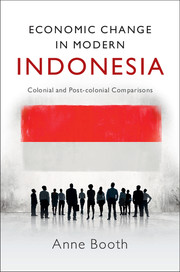Book contents
- Frontmatter
- Contents
- List of tables
- Acknowledgements
- 1 Introduction: Indonesia's three watersheds
- 2 The colonial legacy
- 3 Occupation, liberation and the challenges facing the new republic, 1942–66
- 4 Suharto's economic record: successes and failures
- 5 The 1997–98 crisis and its legacy: dropping out again?
- 6 The SBY years: building a new Indonesia?
- 7 Economic nationalism, economic rationalism and the development of private business after 1950
- 8 Trends in poverty and income distribution: the Suharto era and beyond
- 9 The changing role of government from the colonial era to the post-Suharto years
- 10 Conclusions
- Bibliography
- Index
9 - The changing role of government from the colonial era to the post-Suharto years
Published online by Cambridge University Press: 05 February 2016
- Frontmatter
- Contents
- List of tables
- Acknowledgements
- 1 Introduction: Indonesia's three watersheds
- 2 The colonial legacy
- 3 Occupation, liberation and the challenges facing the new republic, 1942–66
- 4 Suharto's economic record: successes and failures
- 5 The 1997–98 crisis and its legacy: dropping out again?
- 6 The SBY years: building a new Indonesia?
- 7 Economic nationalism, economic rationalism and the development of private business after 1950
- 8 Trends in poverty and income distribution: the Suharto era and beyond
- 9 The changing role of government from the colonial era to the post-Suharto years
- 10 Conclusions
- Bibliography
- Index
Summary
The colonial era: towards a modern fiscal state?
As was argued in Chapter 2, the ethical policy led to a rapid growth in government expenditures on public works, including irrigation, harbour works, post and transport and railways and tramways (de Jong and Ravesteijn 2008: 66). By 1921, public works amounted to around 40 per cent of the colonial budget. The Minister of the Colonies, Idenburg, doubted that an ambitious programme of public works could be funded from current revenues, and thought that loan authorisation powers were essential if these projects were to be completed. After 1915, borrowing increased and by the early 1920s, government debt had risen relative to national income and exports. The debt service ratio (debt service charges as a ratio of export earnings) was almost 6 per cent in 1923 (Booth 1998: table 4.4). By the standards of the late twentieth century, this was hardly a high figure. But it caused concern in the Netherlands, especially in the central bank, and among critics of the ethical policy who argued that it was an extravagant welfare programme that the colony could not afford, and whose longer term benefits were unclear. Government expenditures did grow in real terms until the end of the 1920s, but fell in the first part of the 1930s.
The increased reliance on loan finance was in part due to a perception on the part of colonial officials that it would be difficult to raise more revenues from the indigenous population. Several studies were carried out over the 1920s into tax burdens in both Java and other parts of the country, and concluded that it would be difficult to squeeze much more out of even the better-off elements among the native population. Chinese businesses were often difficult to reach through the income tax, given that their records were often kept in Chinese rather than Dutch. Both the Chinese and European populations were taxed through excises and import duties, and by the end of the 1930s, personal and corporate income taxes accounted for 22 per cent of all government revenues, which was a higher percentage than in most other parts of Southeast Asia (Booth 2013a: table 4). Government borrowing increased sharply after 1930 and by 1933, the debt service ratio had increased to 20 per cent, although it fell later in the decade.
- Type
- Chapter
- Information
- Economic Change in Modern IndonesiaColonial and Post-colonial Comparisons, pp. 199 - 227Publisher: Cambridge University PressPrint publication year: 2016



